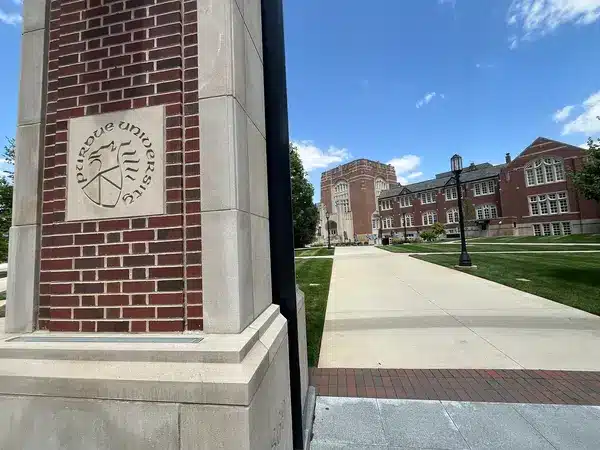
This story was originally published by Based in Lafayette.
By Dave Bangert
Based in Lafayette
February 24, 2025
Purdue stuck tight to the script last week after President Donald Trump called out a $70 million program based at the West Lafayette campus in a recitation of what he considered wasted federal resources.
In other words, the Purdue administration kept quiet – just as Purdue President Mung Chiang and Provost Patrick Wolfe told faculty members it would as White House and Statehouse directives and threatened cuts continued to cascade.
On Tuesday, Feb. 18, after signing a set of executive orders, Trump was asked to clarify the role Elon Musk held, after White House officials had said the billionaire was not a Department of Government Efficiency employee and had no formal authority to make decisions. That was the day Trump said Musk’s consultant role was as “patriot” as cuts came swiftly for federal agencies.
“Where’s the money being spent?” Trump said of targets of Musk and DOGE. “Let’s go into that for just a second.”
Trump skimmed through a dozen multi-million projects, mainly funded on university campuses, that he took issue with. Among them:
“Seventy million dollars for a center at Purdue to research university-sourced, evidence-based solutions to developmental challenges,” Trump said. “I mean, these are massive numbers on things that nobody ever heard about.”
Trump didn’t name specific program, but the $70 million center lines up with LASER PULSE, an acronym for an array of USAID-funded work called Long-term Assistance and Services for Research-Partners for University-Led Solutions Engine.
Directly from the project’s site, it’s described as “a $70M program funded through USAID’s Innovation, Technology, and Research Hub, that delivers research-driven solutions to field-sourced development challenges in USAID Partner countries. A consortium led by Purdue University, with core partners Catholic Relief Services, Indiana University, Makerere University, and the University of Notre Dame, implements the LASER PULSE program through a growing network of 3,000+ researchers and development practitioners in 74 countries. LASER PULSE collaborates with USAID missions, bureaus and independent offices and other local stakeholders to identify research needs for critical development challenges, and funds and strengthens capacity of researcher-practitioner teams to co-design solutions that translate into policy and practice.”
According to the university, Purdue was selected in 2018 the U.S. Agency for International Development to “co-create research-driven solutions for developing countries,” supporting USAID as it “navigates developmental challenges, ultimately leading to societal, environmental, educational and agricultural improvements in partner countries around the world.”
Purdue’s Global Engineering Programs and Partnerships said in an online description that LASER PULSE had “built a vast network of 2,600 researchers and practitioners from more than 61 countries.” Among the research projects LASER PULSE lists deal with maize production in Zambia, post-production milk handling practices in Rwanda and the resilience of Ethiopian communities experiencing recurring violence.
Staff with LASER PULSE did not immediately respond to questions last week about Trump’s comments or the stakes for the program based at the West Lafayette campus.
Purdue spokeswoman Erin Murphy said all updates regarding federal funding were on the university’s page tracking assorted directives, budget issues and court cases. Murphy said Purdue had no comment beyond that.
On Feb. 17, Chiang told members of the faculty-led University Senate that Purdue the “situation consists of multiple parallel tracks and each changes continuously.” Chiang told faculty members and researchers the university would continue to forward federal agency-specific information to relevant principal investigators tied to the funding decisions or court developments whenever the university receives them.
“At any given moment, there are many questions that we don’t know the answers to, just like you,” Chiang said last week. “And we cannot execute on hypothetical directives that have not been given to us. … And we cannot execute on hypothetical directives that have not been given to us.”
Wolfe told faculty members that the university’s public silence shouldn’t imply Purdue was doing nothing behind the scenes. “We’re on top of it,” Wolfe said during last week’s University Senate meeting. “We all realize that it’s going to take quite a lot of work to stay on top of it, and that’s what we’re focused on right now.”
According to Purdue’s federal funding agencies update page, Purdue received 27 stop work orders in late-January related to USAID-funded programs. As of a Feb. 21 update, Purdue wrote that “stop work orders and terminations affecting Purdue USAID and Department of State awards remain in effect until we hear from the agencies.” A preliminary injunction hearing that temporarily halted cuts to USAID funding is set for March 4, according to the site.
The site tracks similar situations for new caps on indirect funding in National Institutes of Health funding, as well as funding containing diversity, equity and inclusion provisions from NASA, the Department of Defense, the Department of Education, the Centers for Disease Control and Prevention and others.
How much money is tied to all of those decisions for Purdue’s campuses isn’t clear.
Dave Bangert retired after 32 years of reporting and writing on just about everything at the Lafayette Journal & Courier. He started the Based in Lafayette reporting project in 2021. To learn more about subscribing to Based in Lafayette, click here.